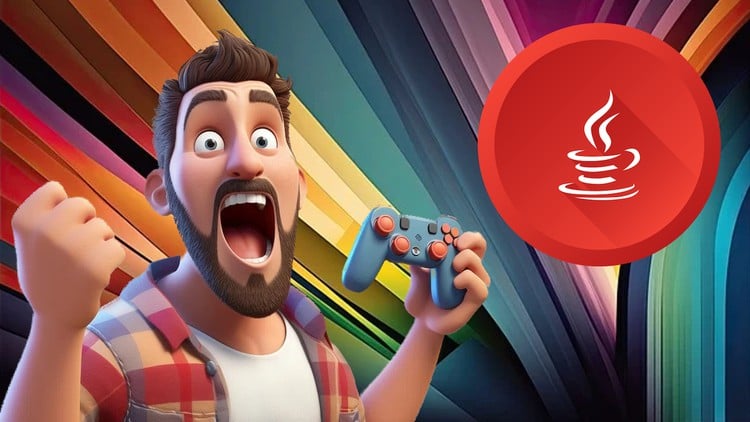
Learn to Build Classic Games from Scratch Using Java
⏱️ Length: 13.2 total hours
⭐ 4.48/5 rating
👥 12,974 students
🔄 November 2023 update
Add-On Information:
Note➛ Make sure your 𝐔𝐝𝐞𝐦𝐲 cart has only this course you're going to enroll it now, Remove all other courses from the 𝐔𝐝𝐞𝐦𝐲 cart before Enrolling!
-
Course Overview
- Embark on an exhilarating journey to master Java through game development. This ‘Java Game Development Masterclass’ offers a hands-on, project-driven approach to constructing fully functional 2D games from scratch. You’ll systematically learn to translate creative ideas into executable code, fostering deep understanding of core programming principles within an engaging context. Ideal for Java enthusiasts or aspiring developers, this course provides a robust framework to build programming prowess while having fun, demystifying game creation into manageable steps.
-
Requirements / Prerequisites
- A foundational understanding of Java’s basic syntax: variables, data types, control structures (loops, conditionals), and methods. Familiarity with OOP concepts is beneficial.
- A personal computer (Windows, macOS, or Linux) capable of running a modern Integrated Development Environment (IDE) like IntelliJ IDEA or Eclipse.
- The Java Development Kit (JDK) installed on your system.
- A keen interest in problem-solving and bringing interactive software to life. No prior game development experience is necessary.
-
Skills Covered / Tools Used
- Game Loop Architecture: Master the fundamental ‘update and render’ cycle for smooth animations and responsive real-time gameplay.
- Event-Driven Logic: Implement dynamic systems reacting to user inputs (keyboard, mouse) and in-game events for interactive experiences.
- Advanced OOP in Practice: Apply inheritance, polymorphism, and encapsulation to design scalable, maintainable game entities.
- Resource Management: Efficiently load, display, and manage diverse game assets: sprites, backgrounds, sound effects, and fonts.
- State Management: Develop robust state machines to control game flow, handling transitions between menus, gameplay, and pause/game over states.
- Animation Techniques: Create compelling visual effects using sprite sheets and frame-by-frame animation, bringing game elements to life.
- Elementary AI Development: Implement basic artificial intelligence for non-player characters, enhancing game challenge.
- Persistent Data Storage: Utilize Java’s file I/O to save and load game data like high scores, adding project depth.
- Debugging and Optimization: Cultivate essential debugging skills for game development, identifying and resolving performance bottlenecks and logical errors.
- Refactoring for Scalability: Learn best practices for structuring codebase, making it easier to expand and maintain.
- Mathematical Foundations: Grasp fundamental mathematical concepts for 2D game physics, movement, and collision detection.
- Tools Used:
- Java Development Kit (JDK): Core platform for Java programming.
- Integrated Development Environment (IDE): Such as IntelliJ IDEA or Eclipse for efficient coding and debugging.
- Standard Java Libraries: Leveraging `java.awt` and `javax.swing` for powerful graphics rendering and user interface creation.
- Version Control (Recommended): Integrate Git/GitHub for project versioning and collaboration.
-
Benefits / Outcomes
- Solid Portfolio Foundation: Graduate with functional, engaging 2D games, ready to showcase your programming and game development abilities.
- Enhanced Problem-Solving Acumen: Sharpen analytical and logical reasoning by tackling real-world game development challenges.
- Comprehensive Software Engineering Understanding: Gain practical insights into design patterns, modular programming, and code organization, applicable across various domains.
- Pathway to Advanced Game Development: Establish a robust understanding of core game mechanics, a springboard for complex game engines.
- Creative Prototyping Capability: Acquire skills to rapidly prototype your own 2D game ideas, transforming concepts into tangible, playable experiences.
- Confidence in Complex Projects: Build confidence to approach and successfully complete large, multi-faceted programming projects.
- Intuitive Grasp of Real-time Systems: Develop an instinctive understanding of how interactive, real-time applications operate.
- Empowerment to Create: Move beyond theoretical knowledge to actively construct interactive software, realizing the full potential of your Java skills.
-
PROS
- Highly Engaging Learning Path: Transforms Java mastery into an exciting process through practical game creation.
- Excellent Instructor and Peer Support: Benefit from a top-rated instructor and a vibrant community of over 12,000 students.
- Up-to-Date Curriculum: Content updated in November 2023 ensures relevance and modern best practices.
- Transferable Skills: Develop core software engineering and problem-solving skills highly valued across the tech industry.
- Instant Gratification: See your code come to life immediately as you build interactive games, reinforcing learning and motivation.
-
CONS
- Primarily focuses on foundational 2D game development using native Java libraries, not advanced commercial game engines.
Learning Tracks: English,IT & Software,Other IT & Software
Found It Free? Share It Fast!